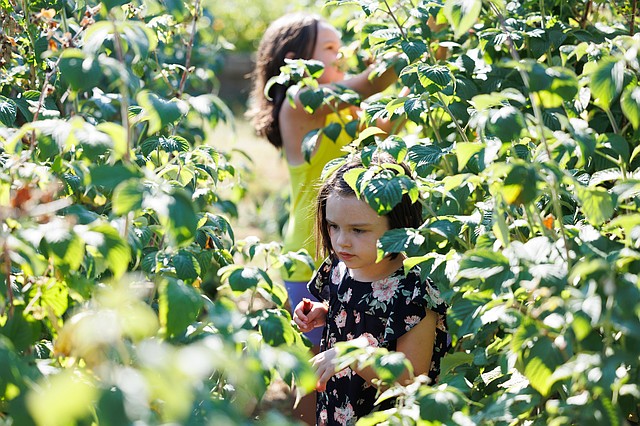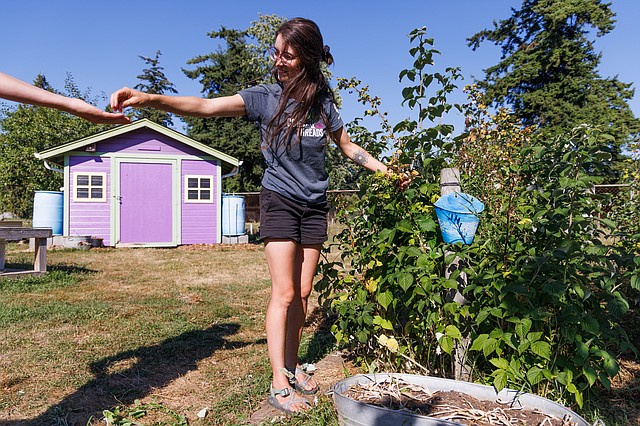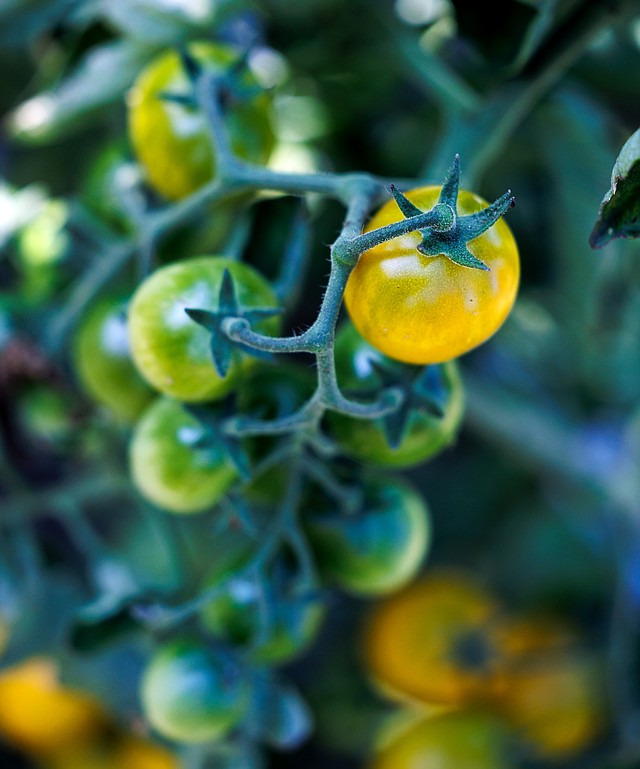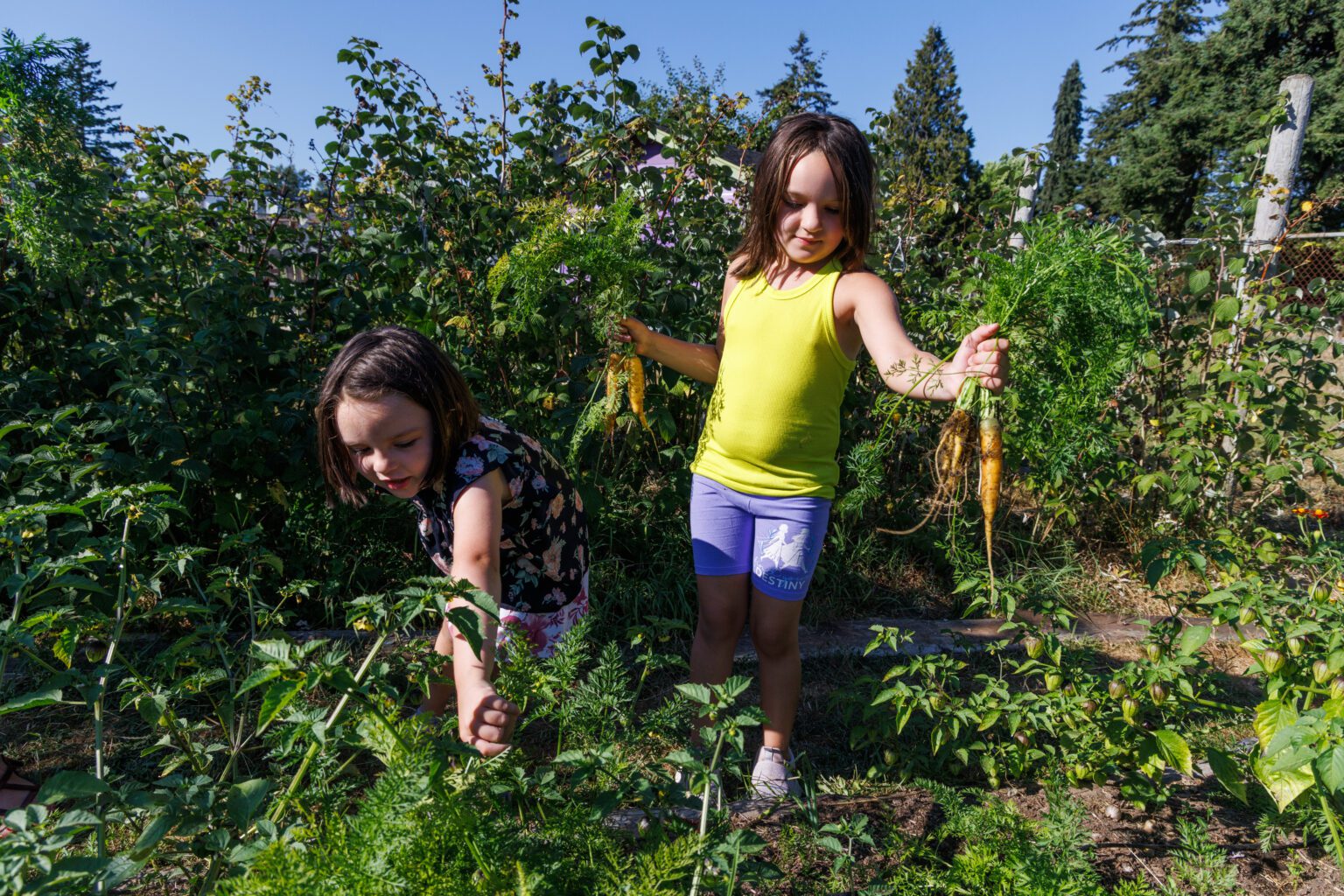The two piles of carrots Alexis Karlsson presented to her mother Jamie on a recent Thursday afternoon were freshly harvested from the Birchwood Elementary School garden, which was started in 2009 with the assistance of Common Threads Farm. The nonprofit with the mission to connect kids to healthy food was founded in 2007 and now helps manage 21 school gardens.
“These ones are all mine, and these ones are Emerald’s,” Alexis, 7, informed Jamie.
Alexis’ veggie haul was slightly larger than her 5-year-old sister’s, but that wouldn’t make a difference when they were taken home to be rinsed and eaten.
That day, with the help and company of AmeriCorps food educator Lauren Bowie and Birchwood Elementary teacher Kelly Morgan — who was Alexis’ first grade teacher — the siblings searched for raspberries among tall vines, found out smaller carrots are a whole lot sweeter than their larger counterparts, and discovered when and how sunflower seeds can be harvested.
 Emerald Karlsson, 5, and her sister Alexis, 7, look for fresh raspberries. (Andy Bronson/Cascadia Daily News)
Emerald Karlsson, 5, and her sister Alexis, 7, look for fresh raspberries. (Andy Bronson/Cascadia Daily News)
According to Bowie, 28, that’s par for the course when it comes to the garden harvests she spearheaded on Thursdays while school has been on recess. Parents and kids show up to help weed and prune, learn a few things about gardening along the way and then head home with a plethora of produce.
“During the summer, we don’t have formal lessons happening in the garden, but a lot of informal learning happens,”
Bowie said. “Just from me spending time in the garden, I’ll have kids come in and I’ll teach them how to harvest a carrot, then I’ll see them come the back next week, and they’ll harvest a carrot and it’s the perfect size. A lot of that learning happens just by being in the garden and opening that space to the community.”
Common Threads founder Laura Plaut, 57, said Bowie’s weekly garden harvest model is something the nonprofit hopes to continue. Before the pandemic, community members were more apt to help tend the various gardens during the summer — while also reaping the edible benefits — but the amount of volunteers and donors has lagged since the arrival of COVID-19.
“I think it’s really great for the community to know these are community spaces and they rely on community support,” Plaut said. “It really can’t happen without both financial and volunteer support.”
When Plaut started Common Threads Farm on Lummi Island in 2007, she was a new mother who wanted to make sure her son grew up with an awareness of where food came from. She said she felt “betrayed” by an educational system that didn’t teach her where food originated, or how caring for the land could help people better understand it.
These days, Plaut and her staff — which include the invaluable AmeriCorps food educators who each help steward a school garden or two — remain focused on promoting a seed-to-table approach to gardening, nutrition and environmental stewardship. By connecting kids to healthy food in the garden, kitchen and on the table, their hope is they’ll end up making food choices that are good for their bodies, communities and the world at large. Most of the time, this education takes place at school.
 AmeriCorps food educator Lauren Bowie hands a fresh raspberry to another person while removing bindweed. (Andy Bronson/Cascadia Daily News)
AmeriCorps food educator Lauren Bowie hands a fresh raspberry to another person while removing bindweed. (Andy Bronson/Cascadia Daily News)
“Lauren spent all fall and all spring doing garden lessons with kids,”
Plaut said. “So the kids planted a lot of this stuff, tended it and learned through that. They’re learning science, learning nutrition and they’re having fun.”
Plaut added that Common Threads did an evaluation of its school food programs — both its gardening and cooking programs — a couple of years ago. The feedback from teachers was that the kids were making healthier food choices, but that wasn’t all.
“What I heard, even more, were words like joy and bravery and teamwork and stewardship,” Plaut said. “For so many kids, this is their gateway to nature.”
Kelly Morgan, who’s been at Birchwood Elementary for 20 years, pointed out that one of the reasons having access to green spaces such as the garden is important is that approximately 50% of the students live in high-density housing, where the planning didn’t incorporate much green space. Plus, she said, the Birchwood neighborhood as a whole is considered a food desert — an urban area where it is difficult to buy affordable or quality fresh food.
Although Birchwood Food Desert Fighters offer a free food Share Spot every Saturday, City Sprouts Farm hosts a Twin Sisters Farmers Market on Sundays through October, and free boxes in the neighborhood are filled with produce and nonperishable food items on a regular basis, Morgan said offering a way for kids to learn about where food comes from — and also growing it, harvesting it and seeing it arrive on their cafeteria plates — is another piece of the sustainability puzzle.
“This is part of a system of responding to an issue that is yet to be solved,” Morgan said. “We just want students to see this is a beautiful space created for them. It’s looking so good right now, and when they come back to school in a couple of weeks, this is going to tell them they’re important enough for people to put this energy in. And for them to see that they can do this, and this is where produce comes from.”
 Cherry tomatoes hang down on a vine at Birchwood Elementary garden. (Andy Bronson/Cascadia Daily News)
Cherry tomatoes hang down on a vine at Birchwood Elementary garden. (Andy Bronson/Cascadia Daily News)
Right now, Common Threads Farm is active in all of the elementary and middle schools in the Bellingham Public Schools district, all of the elementary schools in the Mount Baker School District, and one Ferndale school. The number fluctuates, but one thing that stays the same is that there’s always a need for food educators, financial assistance, volunteers, teacher advocates such as Morgan and support from both the schools and the community.
“When I’m starting a garden with a new school, I always say I’m not here to sell you anything,” Plaut said. “If anything, it’s to the contrary. I want to make sure you really want it because we can do it with you, but we can’t do it for you. Common Threads can offer a lot of support, but then it also relies on teacher advocates like Kelly and community volunteers. A lot of wrap-around love and care goes into a garden, which is part of what makes this program different.
“This is an ecosystem, which I think is wonderful and really powerful for kids to say, ‘It’s space for me, and space I get to help care for.’”
To find out more about garden harvests, volunteer opportunities, work parties, or how to donate to Common Threads Farm, go to commonthreadsfarm.org.




